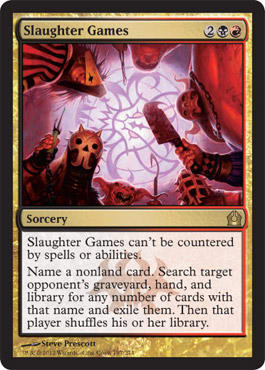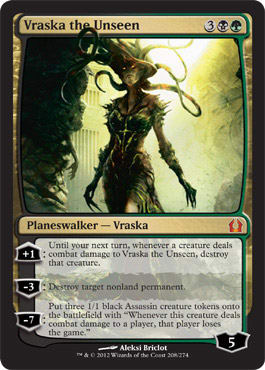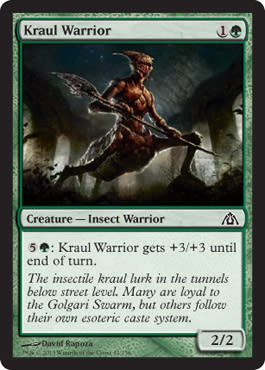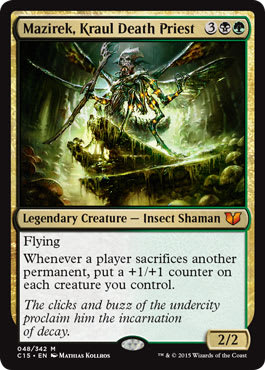"So what is the problem?" Javy asked.
"I don't see a problem," Relov said pointedly.
I know last time I said it'd be silly to try to sort out all Ravnica's issues in the middle of Amonkhet, but then the story team went and dropped a whole story set on Ravnica designed to nudge the plot forward there, with, apparently, the payoff to come in the far future. (There's nothing set specifically on Ravnica in the upcoming releases we know about, although Vraska, a character in this piece, seems slated to appear on the world we're headed to post-Amonkhet.) So, it's time to talk about Ravnica I guess!
Somewhat predictably, this story reveals some of the problems of Ravnica's guild system.
Predictably because practically ALL stories set on Ravnica reveal the problems with the guild system.
Because the guild system sucks.
This is kind of weird, since the ten Guilds of Ravnica, which rule over the whole plane based on two-color ideologies, powersets, and (allegedly) benefits to the broader population, are hugely popular with the fans — so popular that the ending of the first Ravnica block was rolled dramatically back when we returned to the plane in order to keep them in power — and Wizards seems to want players to love them, despite the fact that they're basically all awful. On a systemic level, Ravnica and even more pronouncedly Return to Ravnica are narratives with no protagonists, aside from, maybe, the Gateless. While some guilds are more overtly destructive than others (Gruul riots, Rakdos murder parties) all the guilds are responsible for destruction and suffering that, given the sheer scope of the world-city, challenges our ability to even comprehend it. From Boros suppression of protest, to Azorius corruption and merciless misuse of Ravnica's byzantine laws, to Selesnyan brainwashing, to destructive Izzet and Simic experiments carried out on an unwitting, helpless population, each of the ten guilds has their own special brand of misery to inflict on Ravnica's people.
Not that there's no tradition of this in Magic. Urza was a trainwreck of a person who destroyed everything he ever loved and nearly trashed Dominaria completely in his efforts to save it, Freyalise reversed the Ice Age Urza caused by basically casting Instant Global Warming which went about as well as you can expect, Karn keeps breaking whole planes by accident, and most of the Planeswalkers of Magic's first few years of existence were at best morally questionable, with the act of summoning creatures from one world to another treated in-narrative as just sort of obviously, fundamentally the actions of power-mad demagogues.
All of which is a digression, but not as much of one as it seems. That last bit of history is tied pretty strongly to why Ravnica is the way it is . . . but more on that in a moment. The broader throughline is that Magic's storyline on the whole has a deep tradition of being real suspicious of anyone powerful enough to cast an Eldrazi card or, for that matter, anyone capable of summoning a bunch of Llanowar Elves against their will. So it's not surprising, perhaps, that ten guilds whose only limitations come from how their powers are magically balanced by the same entity that also preserves their existence would be treated in the narrative as, at best, morally suspect.
It's somewhat unsurprising, too, that the Kraul and Vraska would come off as pretty sympathetic in that context.
It's not just that the guilds aren't particularly great for the guildless, or for each other. They're not even that great for people within the guilds at the lower tiers. This is what we see with the Kraul: despite the fact that the Golgari are perhaps, barring the utterly disenfranchised Gruul, at the bottom of the heap in terms of guild power and respect, the (mostly) elves who run the Golgari can still find enough pride in their hearts to trash the Kraul as born servants and laborers, undeserving of respect. What power there is to be had at the top of the Golgari is, it turns out, power enough to corrupt. Not just to corrupt, but to do to high ranking guildmembers what the Planeswalker Spark has traditionally done: elevating people to such a height that life and death decisions become wholly abstract.
It's almost certainly not intentional, but it's certainly notable that this story revolves so much around the pride of the mighty, while this week's story, launching the Hour of Devastation storyline, contains the following line from supreme Planeswalker villain Nicol Bolas: "The dragon was proud. Vanity is survival when one is rapidly losing omnipotence." The pride of Bolas, and of the various guild functionaries who make up the higher strata of Ravnican power, has a real utility to it. If poor Sobeslav had just been too proud to meet with the Kraul, perhaps he wouldn't have had all his organs liquefied!
The pride of the Kraul is, to my mind, a somewhat different thing, because its motivating force — the need to establish an equal footing within a profoundly unequal system — is fundamentally different than the vanity that leads Nicol Bolas to imprint the whole of his being on Amonkhet so that he can avoid the stripping of his own unequal status. To learn pride, for the laborer class of Ravnica, is to learn a self-sustaining will to survive.
Granted, the Kraul are actually in some ways one of the lucky species on Ravnica. Great dragons of Niv Mizzet's ilk are all extinct — Niv made sure he was the only one left! The particular Gorgon subspecies that the Sisters of Stone Death belonged to are now extinct. I believe the specific subspecies of elves Momir Vig belonged to are gone, as are the vampires of Szadek's heritage. We've only seen one Lamassu, and that one was hunted. And so on. I'm not going to claim absolute certainty on all of these, but the broad impression seems pretty clear: Ravnica is a city characterized by, at the very least, passive and accepted serial genocide.
Ravnica is in this sense nearly a post-apocalyptic setting. It just happens to have been apocalyptic for everything that stood in the path of the city and its Guildpact. It doesn't seem that way because to the guilds, at least on the level of their deep institutional power, everything's working just fine. As the corrupt Azorius lawmaker in Shadows of Prahv confidently states, "rules aren't the problem," and the broader rule of law, the system his guild upholds, the same system that resulted in the massacre of Golgari civilians and Vraska's planeswalker ascension, is blameless. The engine is running. That's the same as saying that the engine is morally unimpeachable.
But for countless groups, the rise of the world-city can only be described as ragnarok, a final battle for their very existence. And for some, their very place on Ravnica might be, from the outset, hopelessly marginal and precarious. Remember what I said earlier about the morality of Planeswalkers summoning creatures to distant worlds to battle for them? Well, a major part of the early storyline was the question of just what the heck happens to summoned creatures after a Planeswalker duel ends. Where do they go? What do they do?
It turns out that some of them are powerful vampires, and where they go is "to that dwarf castle" and what they do is "eat everyone inside, then begin plotting to take over all of Ulgrotha and worlds beyond." Ever wondered why Sengir Vampires show up on so many places? Planeswalker duels, folks!
And that's a big part of why Ravnica is the way it is: creatures in the pre-Guildpact days would be summoned to Ravnica by Planeswalkers and then abandoned there to live or die. For what it's worth, Azor — himself not a native to Ravnica! — set up the Guildpact in part to put an end to that nonsense, but the result remained largely the same: Ravnica is a massively diverse plane with, apparently, no one checking to make sure that the communities struggling to survive in the plane don't get wiped off the face of reality entirely. You'd think the Simic would be interested in that given that it's part of their guild mandate and given that it's currently run by a bunch of merfolk who were hidden in vast underground seas for centuries, but nope, apparently they're more interested in seeing how many organisms they can stick sharks into.
I think we need to see Mazirek and Vraska in this context: as survivors of a system that isn't even motivated to kill them but will simply allow their whole species to be snuffed out. My point is not "liquifying organs in the name of a noble cause is justified," that'd be kinda silly. The same goes for "spelling out the Guildpact's name using people you've turned to stone." It's just to say that there's room for some sympathy for the Kraul, caught up as they are within the vicious nature of Ravnica. With the Guildpact himself at best a magical force upholding the very guild structure that exploits the Kraul, and at worst absent entirely because he's off starting revolutions on the planes his Planeswalker rivals have claimed, it's understandable that the Kraul would seek their own radical means of tipping the scales, and there's something admirable about them discovering the sense of pride that allows them to stand against the power of the Guilds rather than be squashed like, well, bugs.
I think in this context the gruesome details in this story about failing organs make a lot of sense. It's not just a neat bit of awful body horror, there's a kind of narrative symmetry to what Mazirek does here, as befits the friend of an assassin whose whole shtick is ironic death.
Ravnica is a vast complex body whose smallest organs can fail without anyone even noticing. The rot spreads deep, though, and as the brain of Ravnica, the arbiter whose word is law, effectively abandons his duties, more and more serious structures fail, because, well, Ravnica was never stable to begin with. Upheld artificially by the Guildpact, Ravnica's body has continued to grind along despite the fact that its constituent parts are constantly on the verge of war with each other.
Vraska and Mazirek didn't summon this rot, they're only herding it toward the inevitable conclusion: the end of the Guilds of Ravnica.


























